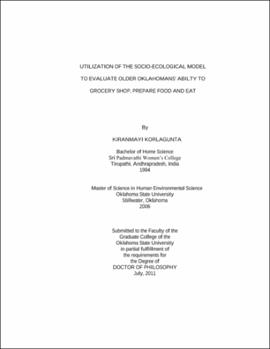| dc.contributor.advisor | Hermann, Janice | |
| dc.contributor.author | Korlagunta, Kiranmayi | |
| dc.date.accessioned | 2013-11-26T08:26:19Z | |
| dc.date.available | 2013-11-26T08:26:19Z | |
| dc.date.issued | 2011-07 | |
| dc.identifier.uri | https://hdl.handle.net/11244/6863 | |
| dc.description.abstract | Findings and Conclusions: The objective of this study was to evaluate factors affecting older adult's ability to grocery shop, cook and eat within multiple socio-ecological model levels of influence. Questions were developed using a 5 point symmetrical Likert scale based on theoretical factors affecting older adults' ability to shop, cook and eat within the intrapersonal, interpersonal and community socio-ecological model levels of influence. Data were collected via a telephone survey from a randomized list of adults, aged 65 and above, who participated in the supplemental nutrition assistance program (SNAP). | |
| dc.description.abstract | Construct factors were identified using factor analysis with varimax rotation. Cumulative multiple logistic regression analysis was used to determine construct factors significant in explaining older adults' ability to shop, cook and eat. Three hundred and seventy older adults completed the survey. Fourteen construct factors were identified. The results of this study indicate that construct factors significant in explaining older adult's ability to grocery shop were physical wellbeing, emotional wellbeing, functional ability, finances, social support, family interactions, friend interactions, food access, and food cost and service. Construct factors significant in explaining older adult's ability to prepare food were physical wellbeing, emotional wellbeing, functional ability, housing, social support, family interactions, friend interactions, and food access. Construct factors significant in explaining older adult's ability to eat were physical wellbeing, emotional wellbeing, dental, functional ability, finances, housing, friend interactions, and food cost. | |
| dc.description.abstract | Older adults' ability to grocery shop, prepare food and eat is influenced by factors within multiple levels of influence. Educational programs and services addressing multiple levels of influence are suggested to improve older adults overall well-being. | |
| dc.format | application/pdf | |
| dc.language | en_US | |
| dc.rights | Copyright is held by the author who has granted the Oklahoma State University Library the non-exclusive right to share this material in its institutional repository. Contact Digital Library Services at lib-dls@okstate.edu or 405-744-9161 for the permission policy on the use, reproduction or distribution of this material. | |
| dc.title | Utilization of the socio-ecological model to evaluate older Oklahomans' ability to grocery shop, prepare food and eat | |
| dc.contributor.committeeMember | Parker, Stephany | |
| dc.contributor.committeeMember | Lucas, Edralin | |
| dc.contributor.committeeMember | Johnson, Christine | |
| osu.filename | Korlagunta_okstate_0664D_11525.pdf | |
| osu.accesstype | Open Access | |
| dc.type.genre | Dissertation | |
| dc.type.material | Text | |
| dc.subject.keywords | eat | |
| dc.subject.keywords | food | |
| dc.subject.keywords | grocery shop | |
| dc.subject.keywords | older oklahomans' | |
| dc.subject.keywords | socio-ecological | |
| thesis.degree.discipline | Human Environmental Science | |
| thesis.degree.grantor | Oklahoma State University | |
